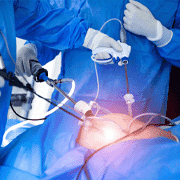Laparoscopy Infertility Treatment - How Effective is It: Things to Know
In This Article
Laparoscopy Infertility Treatment - How Effective is It: Things to Know
Alex
Updated on November 06, 2023
Medically verified by Dr. Arya
Fact checked by Dr. Sharon

Laparoscopic
7 min read
Are you and your partner on the journey to parenthood, but finding the path a bit bumpier than expected? You're not alone. Infertility can be a roadblock on this beautiful journey. But, modern medicine has some impressive tools up its sleeve. One such tool gaining attention is laparoscopy. It is a minimally invasive procedure that could hold the key to your dream of having a family.
And guess what? You don't have to navigate this journey alone. Mykare Health is here to walk alongside you, providing guidance, support, and a helping hand as you figure it all out together. Let's dig into the details.
Laparoscopy: A Glimpse into the Procedure
Laparoscopy is a surgical method that has gained popularity in the field of treating infertility. Often referred to as "keyhole surgery," it includes creating tiny cuts in the abdomen. Through these cuts, a small camera called a laparoscope is put inside. This camera helps the surgeon see the reproductive organs. This way, they can identify any problems that might be causing infertility.
You might wonder why laparoscopy is gaining popularity among fertility treatments. Here's the scoop:
| Advantages of Laparoscopy |
|---|
| Minimally Invasive: Smaller incisions mean less pain and scarring. |
| Quicker Recovery: Compared to traditional surgery, the recovery time is shorter. |
| Precise Diagnosis: The laparoscope offers a clear view, allowing for accurate diagnosis. |
| Targeted Treatment: Surgeons can address specific issues directly. |
| Versatile: Laparoscopy can treat various conditions contributing to infertility. |
The Effectiveness of Laparoscopy
Now, let's tackle the big question – how effective is laparoscopy infertility treatment? Well, studies show promising results, especially for specific conditions like:
-
Blocked Fallopian Tubes: This happens when the tubes connecting the ovaries and uterus are blocked, making it tough for the egg to travel. Laparoscopy can help clear the way and improve fertility.
-
Endometriosis: This is when tissue like the one inside the uterus grows outside, causing pain and fertility issues. Laparoscopy can manage this and improve chances of getting pregnant.
-
Fibroids: These are growths in the uterus that can affect fertility. Laparoscopy can deal with them effectively, improving the odds of conception.
-
Pelvic Inflammatory Disease (PID): It's an infection that affects the reproductive organs. Laparoscopy can help fix issues caused by PID, boosting fertility chances.
-
Ovulation Disorder: When ovulation isn't happening as it should, getting pregnant becomes tricky. Laparoscopy might help with ovulation disorders, depending on the root issue.
For these issues, laparoscopy can make a significant difference by addressing the root cause of infertility. But, keep in mind that not all fertility problems can be resolved with laparoscopy alone.
At Mykare Health, we're here to guide you through these challenges. Our expertise in laparoscopy treatment can make a real difference. We understand these issues and offer top-notch solutions to improve your fertility. Rest assured, we're dedicated to helping you on this journey.
Also Read : laparoscopy for infertility cost in India
Factors Affecting Success Rates
A few factors can affect how well laparoscopy works for infertility:
- Age: Younger people often have better results.
- Underlying Issues: What's causing the infertility and how serious it is matters.
- Your Health History: Your overall well-being can influence how well it goes.
- Surgeon's Skill: A skilled surgeon ups the chances of success.
Mykare Health is here to link you with skilled surgeons who can make a real difference. They can accurately figure out what's going on and offer the best options. Rest assured, we're dedicated to giving you the best shot at success.
Laparoscopic Techniques to Address Infertility
Here's a quick rundown of common laparoscopic procedures for treating infertility:
1.Laparoscopic Ovarian Drilling
Helps stimulate ovulation in women with PCOS by creating small holes in the ovaries.
2.Laparoscopic Myomectomy
Removes uterine fibroids that can hinder pregnancy.
3.Endometriosis Treatment
Removes abnormal tissue growths outside the uterus.
4.Tubal Ligation Reversal
Reconnects previously tied fallopian tubes for those wanting to conceive after tubal ligation.
5.Diagnostic Laparoscopy
Helps identify issues like scar tissue or abnormalities affecting fertility.
These procedures are minimally invasive and can enhance the chances of successful pregnancy.
What to Expect
If you're considering laparoscopy, it's essential to know what you're signing up for:
What to Expect with Laparoscopy
- Small Incisions: The procedure involves a few small cuts in the abdomen.
- Anaesthesia: You'll be under general anaesthesia during the surgery.
- Short Hospital Stay: In most cases, you can go home the same day.
- Recovery Time: You'll need a few days to a week to recover fully.
- Follow-Up Care: Your doctor will guide you on post-surgery care and precautions
 9 min read
9 min readTop 9 Things To Know About Laparoscopic Treatment for Pregnancy
 9 min read
9 min readHow Much Does Laparoscopy Treatment Cost? Here's The Truth
 8 min read
8 min readTreatment After Laparoscopy for Pregnancy - What You Need to Know
Book Your Consultation Now
Making an Informed Decision
While Laparoscopy holds potential, it's vital to be realistic and talk to a fertility expert. Discussing your medical history with the doctor helps decide if laparoscopy is a good fit.
Fertility After Laparoscopy: A Look at the Road Ahead
You've taken the leap and undergone laparoscopy, hoping to pave the way for a smoother journey to parenthood. Now that the procedure is behind you, what can you expect in terms of your fertility? Let's dive into what the post-laparoscopy phase entails and how it might influence your chances of conception.
Post-Procedure Changes: What's Normal?
After laparoscopy, your body might need a bit of time to bounce back. Here are some common experiences in the days and weeks following the procedure:
1.Recovery Period: It's normal to experience some discomfort, mild pain, or bloating around the incision sites. Your doctor will provide guidelines for managing this discomfort.
2.Activity Restrictions: Your doctor may recommend avoiding strenuous activities, heavy lifting, and intense exercise for a certain period to ensure proper healing.
3.Spotting: Light spotting or vaginal bleeding might occur after the procedure. This is typically normal and should subside within a few days.
4.Changes in Menstrual Cycle: Some women notice temporary changes in their menstrual cycle, including irregular periods or spotting between cycles. This is usually a result of the hormonal changes caused by the procedure.
The Waiting Game: Fertility and Timing
You're probably eager to see the effects of the laparoscopy on your fertility, but patience is key. It's not uncommon for couples to conceive within a few months after the procedure, but keep in mind that everyone's journey is unique.
Remember that it takes time for your body to recover from the surgery and for any underlying fertility issues to be resolved. It's best to have realistic expectations and give yourself the time needed for the full benefits of the procedure to become evident.
Optimising Your Chances: Post-Laparoscopy Tips
While you're waiting for the magical moment when you see those two pink lines on a pregnancy test, there are steps you can take to support your fertility:
1.Healthy Lifestyle: Eating a balanced diet, staying hydrated, and getting regular exercise can contribute to your overall well-being and fertility.
2.Tracking Ovulation: Knowing your ovulation window can help the chances of conception. Consider using ovulation prediction kits or apps to track your cycle.
3.Stress Management: High stress levels can impact fertility. Explore relaxation techniques such as meditation, yoga, or deep breathing to keep stress in check.
4.Communication: Keep an open line of communication with your healthcare provider. Regular check-ups and discussions about your progress can provide valuable insights.
Also read more about : Laparoscopy for infertility
Seeking Further Help: When to Consult a Specialist
If you find that your efforts to conceive after laparoscopy aren't yielding results, don't lose hope. It's always a good idea to have a candid conversation with your doctor or a fertility specialist. They can provide guidance, review your medical history, and explore other options that might be suitable for your situation.
At Mykare Health, we're here to stand by your side in this journey. Our dedicated team is ready to assist you in finding the best treatment path. We ensure your efforts are backed by expert support. Remember, resilience and expert guidance are your greatest allies.
Laparoscopy: It's a minimally invasive surgery that can help with infertility. A tiny camera checks your insides and fixes issues that might be stopping you from getting pregnant.
Significant Advantages: Smaller cuts mean less pain, and you'll bounce back quicker. The doctor can spot problems and treat them right there. It's like precision surgery.
When It Works: Laparoscopy works well for certain problems like blocked tubes, endometriosis, fibroids, infections, and irregular ovulation. It tackles the main reasons behind these problems and boosts the chances of getting pregnant.
Success Factors: Your age, the problem's seriousness, your health, and the doctor's skills play a part in how well it works. Skilled doctors are key.
What to Expect: You'll have a few cuts, a nap with anaesthesia, a short hospital visit, and some chill time for recovery. Your doctor will guide you.
After the Surgery: Some discomfort and spotting are normal. Your menstrual cycle might fluctuate a bit, but that's okay.
Waiting Game: Give your body time to heal and the fixes to work. It might take a few months, but hang in there.
Boosting Chances: Stay healthy, track ovulation, relax, and talk to your doctor regularly.
Mykare Health's Got Your Back: We're here to help you out. Our team knows their stuff and will guide you to the best options. You're not alone in this journey!



